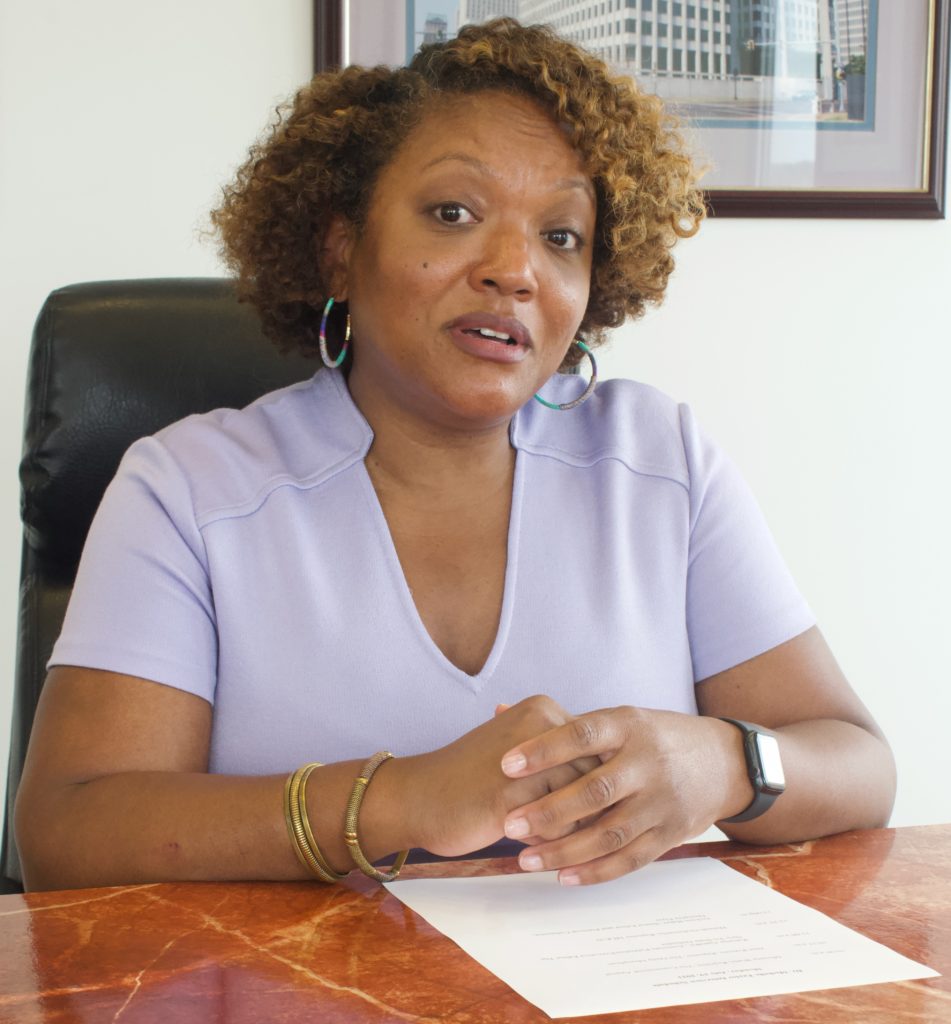Fielding yet another request to direct a journalist seeking Dr. Michelle Taylor, a guard on duty at the Vasco A. Smith Jr. County Administration Building remarked, “She must be an important person.”
For the guard and many others in Memphis and Shelby County, getting to know Taylor is a matter of growing import. Nominated by Shelby County Mayor Lee Harris – and pending July 26th approval by the Shelby County Board of Commissioners – Taylor could become the next director of the Shelby County Health Department.
“Hey, it’s not me that’s important. It’s the community that’s important,” said Taylor in a conversation with The New Tri-State Defender on Monday. “And the Health Department, of course, needs leadership. … you need somebody who can steer the ship and help the Health Department get back to what it has always done really well, which is protecting the health of the community.”
Dr. Alisa Haushalter resigned as Health Department director in February. She had drawn fire from the Tennessee Department of Health regarding concerns associated with local adherence to COVID-19 protocols.
(DEADLINE NOTE: On Wednesday, a Board of Commissioners committee voted to back Taylor’s nomination. However, a memo detailing opposition by an interview panel surfaced during the meeting, stirring concerns.)
Born in North Dakota and well-rooted in Memphis (White Station High School graduate), Taylor – a pediatrician – has this academic pedigree: Howard University (biology major); James H. Quillen College of Medicine at East Tennessee State University; a master’s degree in epidemiology from the University of Tennessee Health Science Center; Harvard University master’s degree in business administration; and a public health doctoral degree from Johns Hopkins University.
Her recent past includes a stay in Andrews, Maryland, where she was an aerospace medicine division chief for the Office of the Air National Guard Surgeon General.
A conversation yields the conclusion that her brand of leadership is anchored with a strong inner attitude and a commitment to data and transparency in steering clear of pretense regarding community health needs.
In nominating her, Mayor Harris said, “I believe Dr. Taylor is the right person to lead our Health Department and pull us all toward shared responsibility.” To Taylor, that means “really being honest with the community about how connected we are, even if we don’t always like to think about it.
“So that means being honest about the data, being honest about what that looks like, and really, truthfully, being honest about what that looks like for different subsets of people and how that may be different. … And then saying, ‘OK, we’re not into pointing fingers. We’re not playing a blame game. Let’s talk about why we’re in this together,’” said Taylor.
“… And if you start to think about the fact that the people that you love are part of a larger community, then it makes it easier to start to talk about shared responsibility.”
Taylor’s parents, who were raised in South Memphis, married at 18. She was born a week after her mother turned 20. Her father joined the Air Force and after his discharge the family moved back to Memphis.
Taylor’s mother later enlisted. The military family subsequently moved to Alaska and later to California. She spent most summers back in Memphis with her grandmothers.
Keenly aware that many children in Memphis have few experiences outside of Shelby County, Taylor was asked about how she might address disparities, particularly those regarding health.

“First, I will tell you that that’s a job that’s bigger than any health director or any individual public health practitioner. … Second, it really is about arming people with data. That’s one thing that I know that the Health Department has done well, particularly over the last 10 years, is start to present that data by ZIP code so people can see it,” she said.
“Across the board, across race and socioeconomic background, when you show people data in that way, in that kind of population way, but still personal, then it motivates people to want to know, ‘Okay, how can I help? What is it that I can do to try to alleviate this issue?’”
Then, she said, “… you get people ready to have a discussion about all of the other things that play into health, besides just the numbers. What is your blood pressure? What is your blood count? When was the last time you saw a doctor or a dentist? …
“You can start to have a conversation with people about what it means to be under-resourced and how that plays into disparities. Or, what it means to be a child living in poverty and how that plays into disparities and how that can follow you for a good portion of your life and health. I think it’s important for whoever would have stepped into this role to understand that and to be able to work on it.”
Public health is a “marathon, not a sprint,” said Taylor, pointing to Shelby County’s infant mortality rates, which she became familiar with during an earlier stint with the local health department.
“The needle has moved in the right direction, but there’s still a lot of work to do. … And some of it has to do with improved sanitation, improved social conditions for some people, improved opportunities to gain education. … those are the types of things that people don’t always think about playing into health.
“And so it’s important for people who represent and work for the health department to be able to explain that to the community at large and their part in it.”
A cancer survivor, Taylor notes that her status as a doctor provided her “a level of privilege” regarding access to care options.
“I would love it if we got to a point where women, no matter what stripe, and just people with an illness in general, are getting the kind of care that I received,” she said. “Now what I will say about most providers in this community is they’re doing the best they can for their patients. I truly believe that. But you do have disparities in health.”
Referencing “under-resourced patients,” Taylor said there must be more focused consideration on, “How do we start to work with that type of population so that they can receive care in a way that I received it. …
“I really think that we need to start looking at it in that kind of frame. …”




